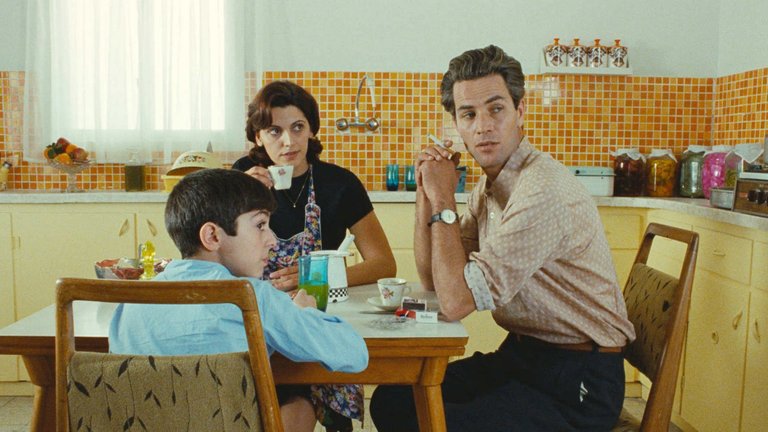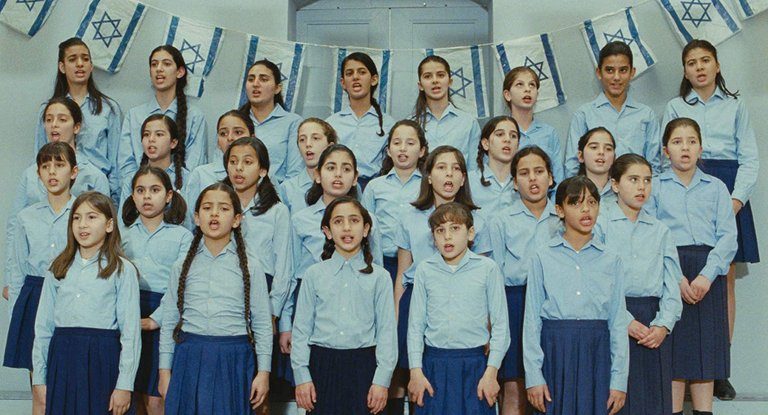"The Time That Remains" is the first film I have seen about Palestine. It is also the first time I have seen a film that examines Palestinian-Israeli relations from the perspective of the Palestinian side. This is the semi-autobiographical film of director Elia Suleiman and the last of his trilogy. I wanted to watched the first two, then write this film review. But after waiting for a long time, I did not find the "Chronicle of a Disappearance (1996)" and "Divine Intervention (2002)". Thus, I had to talk about the feeling of "The Time That Remains" first .
.jpg)
source
To understand this film, I have to understand the small town of Nazareth in the film. This is also a place that puzzles me when I watch a movie. Nazareth is the birthplace of Christ Jesus. At the same time, it is also the largest Arab-dominated city in Israel. Among the 45,000 people, the Arabs occupy more than 90% of the population. In addition to more than 60% of the belief in Islam, nearly 40% people become Christians. This "The Time That Remains" is the story of this group of Arab Christians. The director himself and his family are Arabs who believe in Christianity. Of course, all of the above information was only known after I watched the movie, but I was a little confused when I was watching the movie. The conflict between Palestine and Israel has always been a hot topic of news. In my memory, the two sides of the Palestinian-Israeli conflict should be a conflict between two religions, a conflict between Judaism and Islam. In this film, it is Christians who are in conflict with them. Of course, I also knew before that there are a large number of Christians in the Middle East, such as the Maronites in Lebanon, which is a large sect in Christianity. Even in Jerusalem, there are many Christians. But these Christians in the hometown of Jesus have such a big contradiction with the Israeli army. It is really the first time I heard about it. It seems that my knowledge structure is lacking.

source
Through the eyes of a child, Elia (also the director), the film re-examines the history of Israel since its founding. This history covers the entire two generations of Elia's parents and himself. From his father's youthful blood to Elia's white hair, the history of Israel and Palestine is in them. The generations of the two generations have passed, and the love and hate between the ethnic groups has left a heavy mark on their lives. His father did not calm down the hatred of his home, and he always missed his seemingly calm life. He also passed this hatred to his son, who had a rebellious spirit at school and was deported after being adult. Throughout the film, it is also the history of the entire Palestinian history. The mother of Elia changed from a lady to a bloated old woman, and she spent her life in Nazareth. Hatred continues between father and son, but life is trivial in women. Time is still. Life seems to have changed, and it also seems that everything has not changed.
The film was quite interesting, with humor everywhere, but with a touch of sadness. The neighbors who have all sorts of ills always want to self-immolate. The young people, who call under the cannons of the tanks, form a scene with a very comedy effect. Among the people in the fierce conflict, walking through a woman who pushed the baby carriage calmly also formed an irony. The lines in the play are also humorous in calmness. There are no more plots in the movie, but there are scenes of the scene, with unspeakable sadness, bitterness, and reminiscent of the passing of life in triviality.
My Score is 8.3/10
Critic: AAAMovie URL:https://www.themoviedb.org/movie/44898-the-time-that-remains?language=en-US

This post is upvoted by @dblog.supporter. Visit https://dblog.io now! This is a tribe for all bloggers on Steem blockchain.
Hi, thanks for using the
aaatag for TripleA.I would like to forward the following article, as our manual curation is changing.